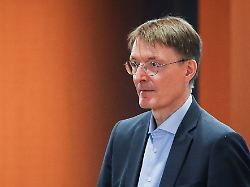Karl Lauterbach with Markus Lanz
“This reform will transform the healthcare system”
By Marko Schlichting
06/23/2023, 04:17 am
The Bundestag wants to pass a law that is intended to put an end to the recurring shortage of medicines. A hospital reform is to follow next year. Minister of Health Lauterbach explains in the ZDF talk show “Markus Lanz” what is about to change.
In Germany, there is a risk of death in hospital. Federal Health Minister Karl Lauterbach from the SPD wants to prevent this. That’s why a health care reform should come into force at the beginning of next year, which Lauterbach wants to discuss with his country colleagues in the coming week. “If this reform did not come, hospital deaths would begin next year and not end in the long term,” he said on Thursday evening on the ZDF talk show “Markus Lanz”. “This reform will transform the healthcare system.”
In Germany there are currently around 1,300 different treatment options, from broken legs to hip surgery and heart transplants. For each treatment, the respective hospital receives a fixed sum of money, the so-called flat rate per case. “The more treatments a hospital offers, the more money it has,” explains Lauterbach. As a result, for example, one or the other knee is operated on that does not need to be operated on at all. The minister names another problem: “If the hospital doesn’t have a top surgeon but still wants to settle the money, someone who isn’t so good at it might operate.” In addition, according to Lauterbach, patients are often treated as inpatients, although outpatient treatment would also be possible.
The Minister of Health therefore wants to start a quality offensive next year. In the individual hospitals, only those areas that are successful are financed by the state. “From January we will evaluate the hospitals according to the quality of the respective intervention,” says Lauterbach. General practitioners and patients can view this rating using a traffic light system. “If I no longer pay for the bad areas at individual hospitals, the patients will go to hospitals for these procedures that can do it better, and then they can also pay better there,” says the SPD politician.
But there is criticism of the reform. According to various state ministers, the supply in rural areas could suffer. Lauterbach sees it differently: “Smaller clinics, for example, get money for minor interventions. We pay them a flat rate of 60 percent. If they then handle fewer cases, they can make ends meet.”
combat drug shortages
As early as today, Friday, the Bundestag is also due to pass a law intended to combat the current shortage of medicines. “Medicines are not produced in Europe, but mainly in India and China,” says Lauterbach. “We sell them with discounts. The companies that do this can only get such a discount agreement if they guarantee us that they will have these drugs in stock for six months.”
In addition, the production of medicines is to be increasingly relocated to the European Union. “We must be independent in the event of a trade war or if we are blackmailed,” said the minister. That’s why only those companies should get supply contracts that produce half of their medicines in Europe. This rule should initially apply to antibiotics, but will apply later to cancer drugs, Lauterbach continues.
Pharmacologist Roland Seifert from the Medical University in Hanover describes one reason for the current delivery bottlenecks in “Markus Lanz”: For the development of a drug there is a patent that runs for ten years. After that, it can theoretically be copied by any company – this creates so-called generics. To prevent this, many pharmaceutical companies make minor changes to their inventions. “Carcinogenic substances are often produced as by-products that can no longer be sold,” says Seifert.
There are currently delivery bottlenecks for 480 medicines that are frequently prescribed. In the case of rare diseases, on the other hand, there are usually no problems. “It’s often about diseases that you don’t even learn about in medical school,” says Seifert. For the scientist, the new law is a step in the right direction. “It won’t solve all the problems, but it’s the first law of its kind that’s ever existed,” he says.
